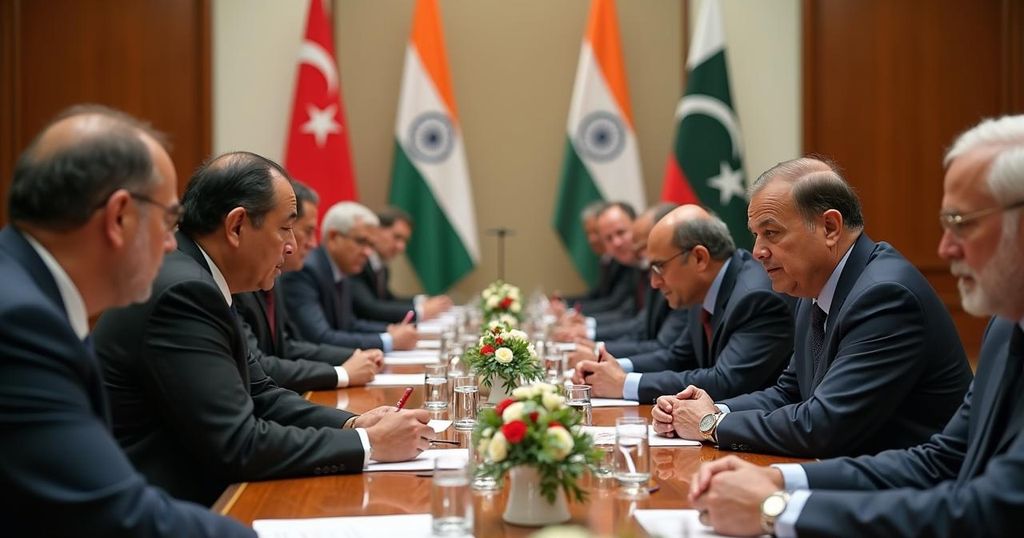India and Pakistan have not requested a bilateral meeting during the SCO Heads of Government summit scheduled for October 15-16 in Islamabad. Pakistan’s Foreign Minister Ishaq Dar confirmed the arrangements for Mr. Jaishankar’s visit, highlighting a lack of expectations for significant developments in bilateral relations. The meeting is primarily focused on multilateral discussions, with security concerns rising amid planned protests in Pakistan.
Neither India nor Pakistan has initiated a request for a bilateral meeting during the scheduled Shanghai Cooperation Organisation (SCO) Heads of Government summit on October 15-16, as confirmed by Pakistan’s Foreign Minister Ishaq Dar. He communicated that Pakistan intends to receive External Affairs Minister S. Jaishankar with full diplomatic protocol, fulfilling their obligation as a courteous host. This statement follows Mr. Jaishankar’s earlier assertion regarding his attendance as a responsible member of the SCO. The summit will witness the arrival of Mr. Jaishankar along with leaders from the 10-member SCO, including Iranian Vice-President Mohammadreza Aref and Prime Ministers from Belarus, Kazakhstan, Kyrgyzstan, Tajikistan, and Uzbekistan, on Tuesday. Notably, Russian Prime Minister Mikhail Mishustin and Chinese Premier Li Qiang are scheduled to arrive a day earlier for separate meetings with Pakistani officials. While the Ministry of External Affairs (MEA) has not disclosed specific details regarding bilateral discussions Mr. Jaishankar might hold, there is considerable speculation regarding a potential meeting with the Chinese leader, particularly in light of the forthcoming BRICS summit where Indian Prime Minister Narendra Modi is expected to interact with Chinese President Xi Jinping, amidst ongoing tensions along the Line of Actual Control. Amidst the backdrop of limited expectations for an India-Pakistan meeting in Islamabad, analysts express skepticism about the ramifications of Mr. Jaishankar’s visit on bilateral relations. This marks the first visit by an Indian Foreign Minister in nearly ten years. During his tenure, the last Indian External Affairs Minister, Sushma Swaraj, visited Pakistan in 2015, which was intended to revive the Comprehensive Bilateral Dialogue but subsequently faltered after the Pathankot terror attacks. “India’s Foreign Minister has not asked for any meeting, and we haven’t requested a bilateral meeting either. He will come as a guest for the SCO, and discussions will be held on multilateral issues,” stated Mr. Dar while addressing the media and highlighting the significance of the SCO meeting as a landmark multilateral event for Pakistan in nearly thirty years. In March of the current year, Mr. Dar had relayed that Pakistan would meticulously contemplate reinstating trade relations with India, which have been suspended since 2019; however, tangible progress has been lacking. In response to inquiries regarding whether trade could be discussed during the SCO meeting, Mr. Dar clarified that while Pakistan engages in discussions concerning initiatives like the TAPI (Turkmenistan-Pakistan-Afghanistan-India) energy pipeline with certain SCO members, these efforts are not part of the SCO agenda. “In a broader context, we speak about connectivity and road and rail linkages with many members of the SCO bilaterally. But the mandate of the SCO will be multilateral, and the agenda is fixed,” he emphasized. The Pakistani government has raised concerns regarding security measures, especially in light of planned protests by the opposition Pakistan Tehreek-e-Insaf Party (PTI) on October 15, led by former Prime Minister Imran Khan, who is currently incarcerated. There are fears of a repeat of previous protests that resulted in clashes with law enforcement. Consequently, over 9,000 police personnel have been deployed with demonstrations banned in major urban areas. In a surprising allegation, a senior member of the Pakistani government implicated India in influencing the PTI protests. “Pakistan’s neighbour can’t digest the fact that we are going to be hosting the SCO Summit so they in connivance with PTI have caused disruptions,” remarked Ahsan Iqbal, Pakistan’s Minister for Planning Development & Special Initiatives, although he refrained from naming India directly. However, the MEA has yet to respond to this assertion.
The current diplomatic landscape between India and Pakistan is characterized by a cautious and strained relationship, particularly in light of unresolved territorial disputes and historical tensions. The upcoming SCO summit presents a significant platform for multilateral dialogue; however, the absence of any mutual requests for bilateral meetings underscores the prevailing cautiousness surrounding India-Pakistan relations. Historically, past summits have provided opportunities for reconciliation or dialogue, but recent developments suggest a lack of momentum towards improving bilateral ties.
In summary, the upcoming SCO Heads of Government meeting in Islamabad will mark a notable diplomatic event; however, the absence of requested bilateral meetings between India and Pakistan reflects the ongoing complexities in their relations. Despite the presence of high-level leaders, the focus remains on multilateral discussions rather than direct dialogue, with speculations and concerns surrounding security and opposition protests dominating the narrative. The situation emphasizes the need for cautious engagement moving forward, and it remains to be seen how these dynamics will evolve during the summit and beyond.
Original Source: www.thehindu.com







